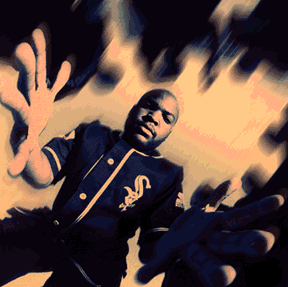
Controversial hardcore rapper who formerly worked with the equally inflammatory NWA. Following a relatively stable background, with both his mother and father working at UCLA, Cube entered the homeboy lifestyle: 'One day I was sitting in class with a friend called Kiddo and we had some time on our hands, so he said let's write a rap'. At the age of 16 he penned his first important rap, 'Boyz 'N The Hood', which was later recorded by Eazy-E. He subsequently spent time with CIA, an embryonic rap outfit produced by Dr Dre. As guest lyricist, he brought NWA '8 Ball' and 'Dopeman', which would comprise the opening salvo from the band. After studying architectural draughtsmanship in Phoenix, Arizona, he returned to the NWA fold in time for the ground-breaking Straight Outta Comption. He would leave the group at the tail-end of 1989, amid thinly veiled attacks on NWA's Jewish manager Jerry Heller. His debut album, recorded with Public Enemy producers the Bomb Squad, drew immediate mainstream attention with its controversial lyrical platform. As well as homophobia and the glamorization of violence, his work was attacked primarily for its overt sexism, raps about kicking a pregnant girlfriend ('You Can't Fade Me') notwithstanding. Conversely, Ice Cube overlooks a production empire (Street Knowledge) run for him by a woman, and he also fostered the career of female rapper Yo Yo(who appears alongside him defending her gender on AmeriKKKa's Most Wanted 's 'It's A Man's World'). The politicization of his solo work should also be noted; in his NWA days he had once written, 'Life ain't nothing but bitches and money', but his words since then have incorporated numerous references to black ideology that add up to something approaching a manifesto. His defence against critical discomfort with his rhymes, 'I put a mirror to black America', has been hijacked by many other, less worthy cases. To Ice Cube's credit, he went on to produce two excellent sets, The Predator and Lethal Injection. The former, in particular, boasted a much more discursive approach to the problems of the ghetto, including reflections on the Los Angeles riots and the Rodney King beating. Perhaps it was marred by the blunt sexism of tracks such as 'Cave Bitch', but it was certainly an advance. Musically it was typified by a stirring 'One Nation Under A Groove', with a lead vocal by the song's writer, George Clintion. In 1993 he also teamed up with fellow rapper Ice-T, with whom he shares more than a similarity in name, to launch a fashion range incorporating a gun logo. No stranger to controversy, Ice Cube became better acquainted with commerce too. His 1992 film Trespass, retitled after the LA Riots deemed original moniker Looters unsavoury, saw him team up with Ice-T once more. He had already starred in John Singleton's 1991 hit film, titled after his first rap, Boyz 'N The Hood, and later appeared in the same director's Higher Learning. Having completed four million-selling albums, Ice Cube's career attracted the attention of those outside the hip-hop fraternity. 'It Was A Good Day' gave him a massive profile via MTV. Like Ice-T, Cube was targeted on right wing assassination lists discovered by the police in 1993. However, his career has continued unabated. Street Knowledge has provided Da Lench Mob and Kam with successful albums on which Cube has acted as executive producer, and he has set up a second subsidiary, titled after his posse, Lench Mob, and written several screenplays. The soundtrack to his 1998 directorial debut, The Players Club, was a Top 10 success in the USA. The film itself, set in a strip club, was one of the year's suprise successes, having grossed $20 million at the box office only six weeks after its April release.
Copyright © 1999-2000 HIPHOPSTOP Inc. All rights reserved.